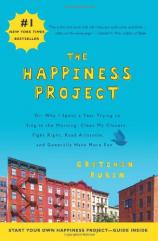Reading Group Guide
Discussion Questions
The Happiness Project

1. Gretchen argues throughout The Happiness Project that striving to be happy is a worthy, not selfish, goal. Do you agree? Do you think that Gretchen was right, or not, to devote so much time and attention to her own happiness? Do you spend much time thinking about your happiness?
2. The Happiness Project is packed with quotations. Which quotation resonated most with you? Do you have a quotation that has been particularly meaningful in your own life --- that you’ve included in your email signa¬ture or taped to your desk, for example?
3. One of Gretchen’s resolutions is to “Imitate a spiritual master.” Do you have a spiritual master? Who is it? Gretchen was surprised to realize that St. Therese of Lisieux was her master. Do you know why you identify with your spiritual master?
4. Gretchen observes that “Outer order contributes to inner calm,” and many of her resolutions are aimed at clutter-clearing. Do you agree that clutter affects your happiness?
5. One of Gretchen’s main arguments is that “You’re not happy unless you think you’re happy,” and she spends a lot of time thinking about her happiness. However, many important figures have argued just the opposite; for example, John Stuart Mill wrote, “Ask yourself whether you are happy, and you cease to be so.” What do you think? Does striving for happiness make you happier? Or does it make happiness more elusive?
6. Did reading this book make you want to try one of the resolutions? Which one?
7. A criticism of The Happiness Project might be that writing a “year of…” book is gimmicky. Did you like the “experiment for a year” approach, or did it strike you as a cliché? Why do you think so many authors are drawn to this structure?
8. Many memoirs recount the author’s struggle to be happiness in the face of a major challenge like cancer, divorce, an unhappy childhood, massive weight loss, and the like. In the book’s opening, Gretchen admits that she has always been pretty happy. Did you find her reflections on happiness helpful, nevertheless? Or do you think it’s more valuable to read an account by someone facing more difficulties?
9. Gretchen writes, “Everyone’s happiness project will be different.” How would your happiness project be different from Gretchen’s? How might it be the same?
10. What was the one most valuable thing you learned from The Happiness Project about happiness --- for yourself?
The Happiness Project
- Publication Date: March 1, 2011
- Paperback: 336 pages
- Publisher: Harper Perennial
- ISBN-10: 006158326X
- ISBN-13: 9780061583261








